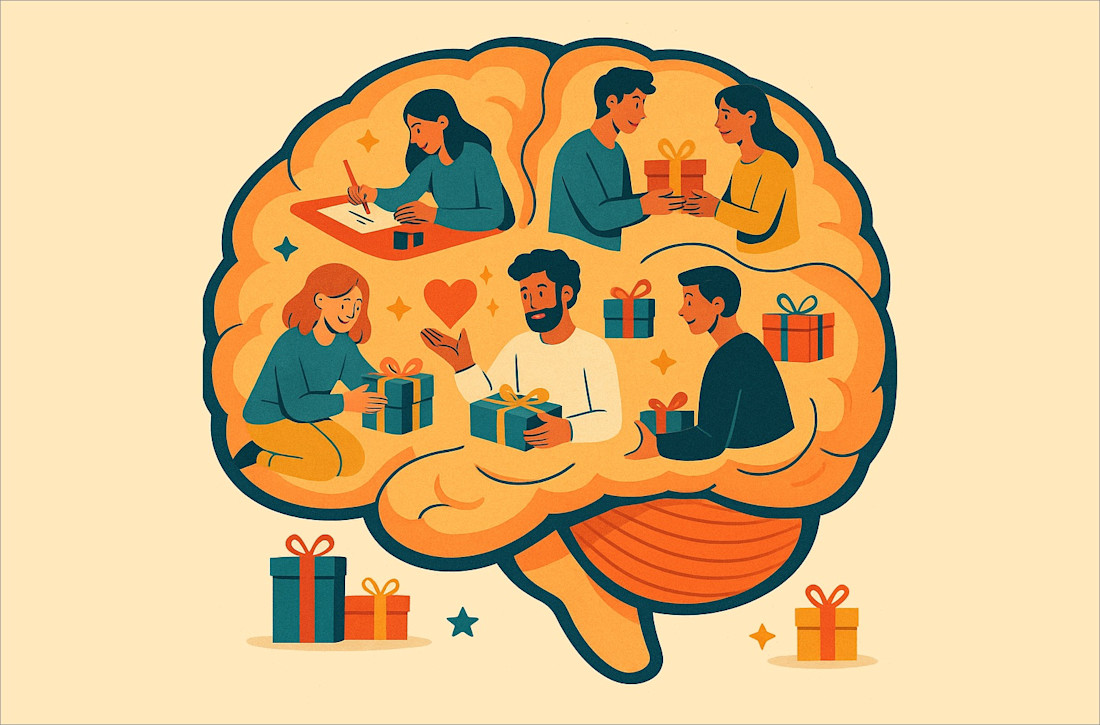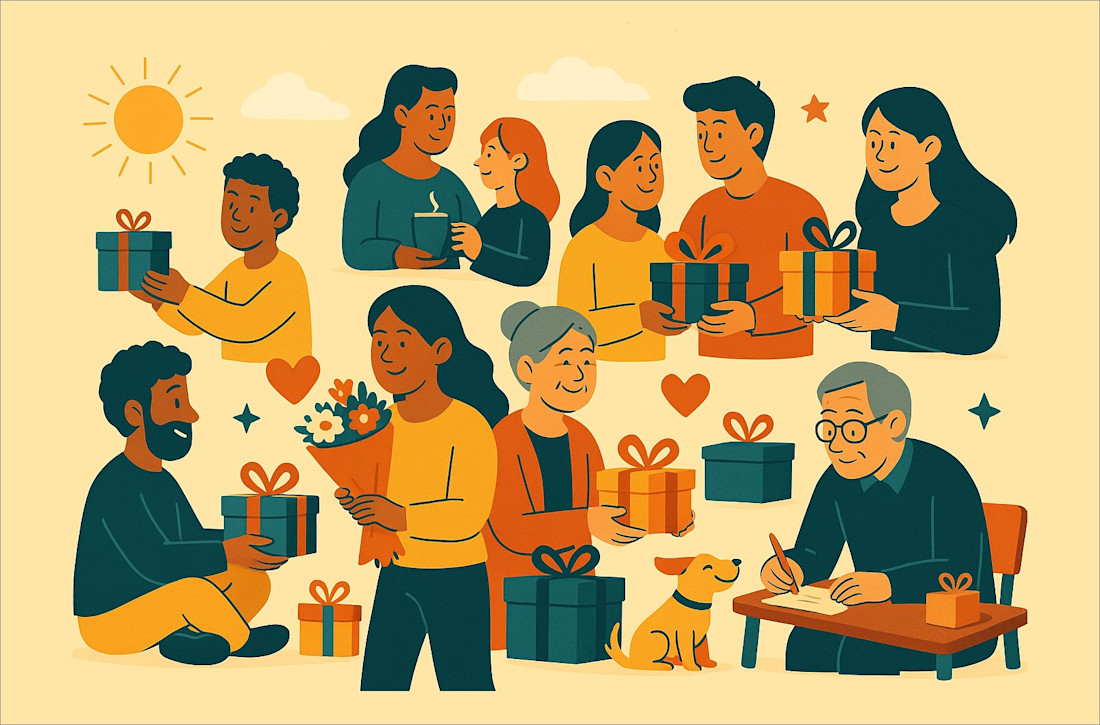Have you ever handed someone a gift and felt a rush of warmth as you watched their face light up? I certainly have. Gift-giving is woven into our lives - from birthdays and holidays to spontaneous tokens of appreciation, and it turns out those good vibes we feel when giving are not just in our heads.
As someone who loves finding the perfect present, I've often wondered why giving feels so good. In this post, I’ll explore the psychology of gift giving and what science says about the benefits of generosity. We’ll dive into how giving triggers happiness, the emotional benefits of giving, and how gift giving strengthens relationships. By understanding the science of generosity, you might find even more reasons to cherish that next gift exchange.

The Science of Generosity: Why Giving Feels Good
Have you ever wondered why giving feels good on a biological level? Psychology and neuroscience offer some fascinating answers.
When you give someone a gift or help someone in need, your brain responds with a wave of positive neural activity. Studies using functional MRI scans have shown that both giving and receiving gifts activate core regions of the brain associated with reward and pleasure.
Generosity actually triggers the same "reward circuitry" in your brain as other enjoyable activities, such as eating delicious food or receiving money. Nature has literally wired our brains to feel good when we do good.
Part of this neurological reward comes from a cocktail of feel-good chemicals released when we act generously. Psychologists emphasise three in particular:
Dopamine, which generates pleasure.
Serotonin, which regulates mood.
Oxytocin, often nicknamed the “love hormone,” which fosters feelings of connection and trust.
Ever experienced that warm, fuzzy feeling after giving a gift or volunteering? That’s oxytocin at work, bonding you to others. Meanwhile, the dopamine rush gives you a burst of joy and excitement.
This biochemical reaction has been dubbed the "helper’s high," a very real phenomenon where helping others produces a mild euphoria. Psychologists confirm that this “warm glow” is genuinely real and beneficial.
Remarkably, even anticipating generosity can make us happier. One neuroscience experiment found that simply planning to spend money on someone else activated areas of the brain linked to altruism and happiness, even before the gift was actually given. We get a mood boost just knowing we’re about to make someone’s day.
Our brains reward generosity because, from an evolutionary standpoint, cooperation and kindness helped humans thrive. Essentially, the positive feeling you get from helping others is your brain’s way of saying, "That was great, let’s do it again!"
Gift-Giving and Happiness: Emotional Benefits of Giving
Beyond brain chemistry, gift-giving and happiness are deeply intertwined in everyday psychology.
Think about the last gift you gave that someone truly appreciated - you probably felt joy, excitement, and pride. Those emotional benefits are backed by research.
Studies across diverse cultures consistently find that people feel happier when giving gifts or spending money on others rather than themselves. This universal link between generosity and happiness underscores our deep-rooted nature to give.
The benefits of gift-giving go even further, positively impacting overall well-being. Generosity is linked to lower stress levels, reduced anxiety, and improved mental health.
For example, engaging in gift-giving or acts of kindness has been shown to lower cortisol - the stress hormone, in our bodies. Regular generosity even correlates with better physical health and longevity, including lower blood pressure and improved immune response.
Crucially, the emotional rewards of giving don’t rely on grand gestures. Small acts count just as much.
Researchers found that even spending as little as £5 on someone else significantly increases your happiness compared to spending that money on yourself.
It's truly the thought that counts - a coffee, a homemade card, or a surprise gift can brighten your day as much as the receiver’s. This sense of connection and purpose is why giving often brings longer-lasting happiness than receiving gifts.
If gift-giving feels stressful, know you’re not alone. A common anxiety is worrying if the gift will be appreciated. To ease this, using a wish list tool - such as Giftwhale, can significantly reduce the stress of gifting.
When your friends or family members share their wish lists, you confidently choose gifts they'll genuinely enjoy. This allows you to fully savour the happiness of giving, knowing your gift will delight them.
Remember, research confirms that the emotional benefits primarily come from showing you care—not the price tag. Your generosity itself boosts happiness, especially when you witness it brighten someone else’s day.

Gift-Giving Strengthens Relationships
One of the most profound impacts of giving is how it strengthens relationships. Gift exchanges are more than transactions - they’re symbolic acts that deepen bonds.
Psychologists describe gifts as "tools for connection, care, and relationship management". A thoughtful gift sends a clear message: “I see you. I appreciate you. I care about your happiness.”
Over time, these gestures build trust, intimacy, and understanding.
Studies confirm that meaningful gift-giving actively fosters closeness by affirming positive relationship qualities. Sharing gifts with loved ones often makes us happiest and strengthens bonds.
Interestingly, giving itself can enhance your feelings of connection. When we give, we tend to see the recipient in a more positive light and feel closer as a result. Empathy involved in thoughtful gifting builds mutual understanding, creating lasting memories that enrich relationships.
Reflecting on Giving (and How Giftwhale Can Help)
Consider the most meaningful gift you’ve given. How did seeing their reaction make you feel? That memory is the psychology of gift-giving in action.
At Giftwhale, we deeply believe in this power of generosity. We aim to simplify gift planning, enabling you to focus on creating joyful, meaningful experiences. Our motto - "Create wonderful wish lists, receive better gifts" - reflects our mission to enhance happiness through thoughtful gifting.
Gift-giving enriches both giver and receiver, strengthening bonds and fostering happiness. So next time you're preparing a gift, embrace that positive anticipation—that warm glow is already beginning.
If you ever need support turning generosity into reality, we're here to help. Start by creating your wish list, and remember: every thoughtful gift is an investment in happiness and connection.
Ultimately, gift-giving is a win-win: it uplifts others and nourishes our souls, uniting us through the fundamental joy of generosity. 🎁




